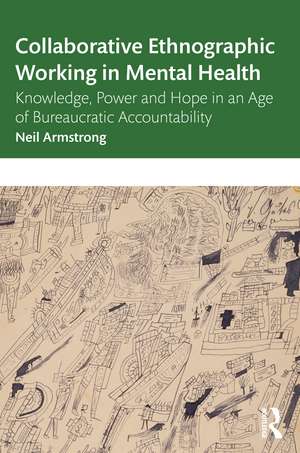Collaborative Ethnographic Working in Mental Health: Knowledge, Power and Hope in an Age of Bureaucratic Accountability
Autor Neil Armstrongen Limba Engleză Paperback – 7 dec 2023
This book is written with a non-specialist audience in mind, as it is intended for all with a stake in mental healthcare research and practice. It is also for those with an interest in ethnographic methods, as a novel way of deploying ethnography, autoethnography and coproduced ethnography to address clinically important research topics.
| Toate formatele și edițiile | Preț | Express |
|---|---|---|
| Paperback (1) | 272.45 lei 3-5 săpt. | +14.59 lei 10-14 zile |
| Taylor & Francis – 7 dec 2023 | 272.45 lei 3-5 săpt. | +14.59 lei 10-14 zile |
| Hardback (1) | 1152.50 lei 6-8 săpt. | |
| Taylor & Francis – 7 dec 2023 | 1152.50 lei 6-8 săpt. |
Preț: 272.45 lei
Preț vechi: 286.80 lei
-5% Nou
Puncte Express: 409
Preț estimativ în valută:
52.18€ • 53.76$ • 43.71£
52.18€ • 53.76$ • 43.71£
Carte disponibilă
Livrare economică 01-15 februarie
Livrare express 21-25 ianuarie pentru 24.58 lei
Preluare comenzi: 021 569.72.76
Specificații
ISBN-13: 9780367722944
ISBN-10: 0367722941
Pagini: 188
Ilustrații: 8 Halftones, black and white; 8 Illustrations, black and white
Dimensiuni: 156 x 234 x 14 mm
Greutate: 0.26 kg
Ediția:1
Editura: Taylor & Francis
Colecția Routledge
Locul publicării:Oxford, United Kingdom
ISBN-10: 0367722941
Pagini: 188
Ilustrații: 8 Halftones, black and white; 8 Illustrations, black and white
Dimensiuni: 156 x 234 x 14 mm
Greutate: 0.26 kg
Ediția:1
Editura: Taylor & Francis
Colecția Routledge
Locul publicării:Oxford, United Kingdom
Public țintă
Postgraduate, Professional, and Undergraduate AdvancedNotă biografică
Neil Armstrong is a medical anthropologist. He is a Fellow of Harris Manchester College, Oxford and Research Associate at Kings College London, UK. He is also a former psychiatric patient.
Recenzii
"Each chapter has a clear message and offers conceptual insight unmasked by anthropologists’ usual convoluted prose. The focus on bureaucracy in practice, and its internal effects, has wide implications for clinical research, opening the lid on that which is neglected in usual intervention-focused studies. In this sense, the book is a major cross-disciplinary bridge-building contribution. Indeed, I think the book makes clear in a way that few others have, why ethnographic research is important to getting to the heart of contemporary dilemmas in psychiatric care; especially by taking seriously the everyday experience and representational practices of patients and staff. The book avoids polarising debate around psychiatry, and taking a fresh viewpoint provides a common platform of shared concern about real challenges." -- David Mosse, Professor of Social Anthropology, SOAS, University of London, UK
"Dr Armstrong’s incisive analysis of the mental health system challenges complacent and particularised explanations and presents a mature and systemic account of why mental health systems continue to struggle – harm – fail. Sharing his own lived experience of recovery and evolving agency, we see the demise of well-intentioned and highly trained clinicians to serve the structural and bureaucratic agency of the institution, be that the state, the hospital, the prison and criminal justice system. He does this through the powerful stories and voice of the most afflicted, marginalised, and excluded, providing some seminal lessons for practitioners, policy makers, legislators. Although he brings theory into to the analysis, he does so cautiously, never failing to sketch out the limitations of worshipping theory rather than testing it through real world experience and local realities." -- Professor Kamaldeep Bhui, Professor of Psychiatry and Senior Research Fellow, University of Oxford, UK
"Dr Armstrong’s incisive analysis of the mental health system challenges complacent and particularised explanations and presents a mature and systemic account of why mental health systems continue to struggle – harm – fail. Sharing his own lived experience of recovery and evolving agency, we see the demise of well-intentioned and highly trained clinicians to serve the structural and bureaucratic agency of the institution, be that the state, the hospital, the prison and criminal justice system. He does this through the powerful stories and voice of the most afflicted, marginalised, and excluded, providing some seminal lessons for practitioners, policy makers, legislators. Although he brings theory into to the analysis, he does so cautiously, never failing to sketch out the limitations of worshipping theory rather than testing it through real world experience and local realities." -- Professor Kamaldeep Bhui, Professor of Psychiatry and Senior Research Fellow, University of Oxford, UK
Cuprins
1. Everybody Knows About Mental Health
2. What Does it Mean to Know About Mental Healthcare?
3. No Mental Healthcare Without Mental Healthcare Institutions
4. Bipolar: The Beautiful Opponent with Catriona Watson
5. Learning to be Ill, Learning to be Well
6. Untethered with Hugh Palmer
7. Us and Them: Why Nobody Wins with Rowan Jones
Conclusion
2. What Does it Mean to Know About Mental Healthcare?
3. No Mental Healthcare Without Mental Healthcare Institutions
4. Bipolar: The Beautiful Opponent with Catriona Watson
5. Learning to be Ill, Learning to be Well
6. Untethered with Hugh Palmer
7. Us and Them: Why Nobody Wins with Rowan Jones
Conclusion
Descriere
This book is an ethnographic exploration of mental healthcare, which uses both ethnographic research and personal co-ethnographic / co-authored narratives to show the experiences and limits of those bring treated for severe mental health issues, often in a hospital setting.
